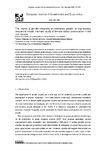The impact of gender inequality on economic growth: an explanatory sequential mixed methods study of female labour participation in the civil service

View/
Use this link to cite
http://hdl.handle.net/2183/32640Collections
Metadata
Show full item recordTitle
The impact of gender inequality on economic growth: an explanatory sequential mixed methods study of female labour participation in the civil serviceDate
2022-12-01Citation
Kam, A. J. Y., Oboh, J. S., Othman, Z., & Sufian, J. (2022). The impact of gender inequality on economic growth: an explanatory sequential mixed methods study of female labour participation in the civil service. European Journal of Government and Economics, 11(2), 210-233. https://doi.org/10.17979/ejge.2022.11.2.8951
Abstract
[Abstract] Gender inequality is recognised as an impediment to economic growth and development. In Nigeria, several policies have been enacted to eliminate gender inequality. However, studies show that women are grossly marginalised, exploited, and discriminated against in their socioeconomic life. This paper examines the impact of gender inequality and female labour participation in the Nigerian civil service on the economic growth of Nigeria using mix-methods. First, an estimation of the impact of gender inequality on economic growth using panel data regression, followed by content- and consistency-based analysis that examines the factors responsible for gender inequality and discrimination issues women experience in the Nigerian civil service using content- and consistency-based analysis. The findings suggest that gender inequality negatively impacts economic growth and distorts the pool of human capital available to the Nigerian civil service and recommends the use of education and outsourcing of some employment functions to eliminate it effectively.
Keywords
Gender inequality
Female labour participation
Civil service
Culture and tradition
Economic growth
Female labour participation
Civil service
Culture and tradition
Economic growth
Editor version
Rights
Attribution-NonCommercial 4.0 International (CC BY-NC 4.0)





